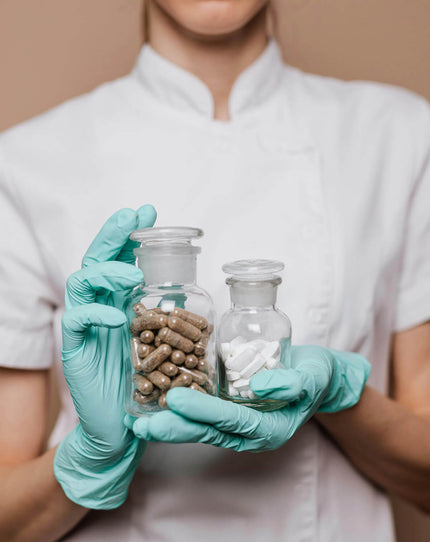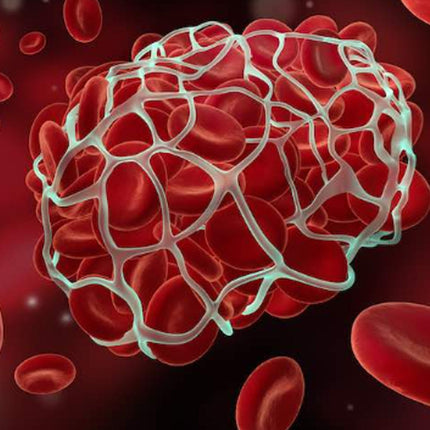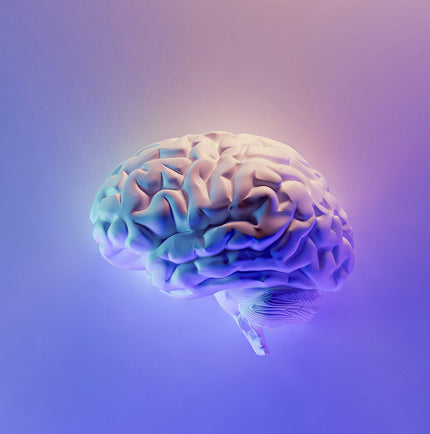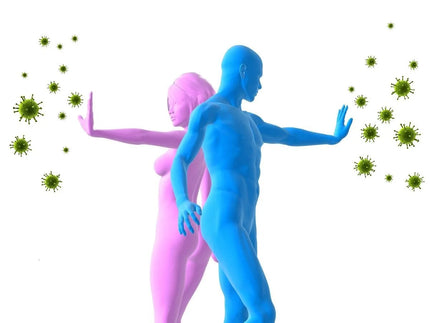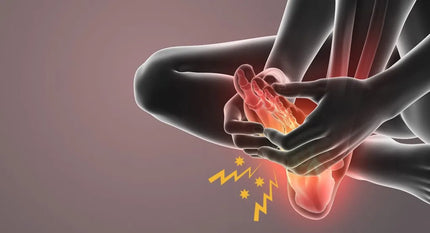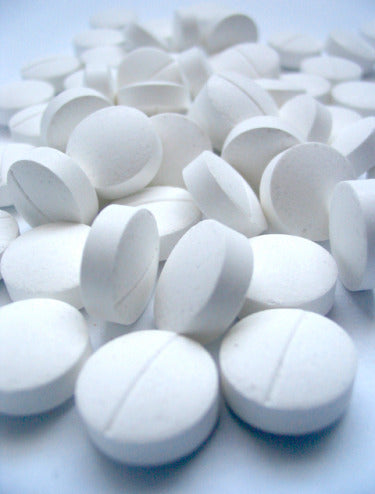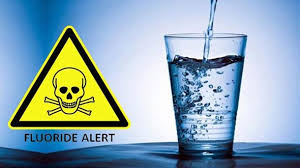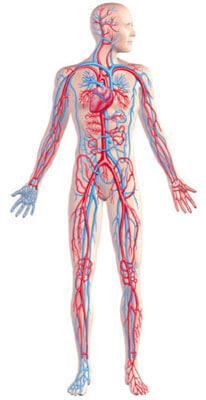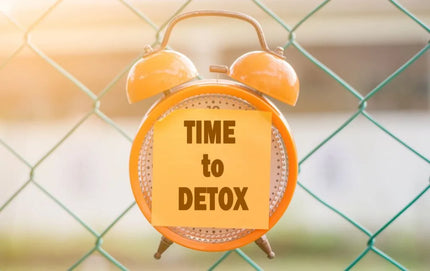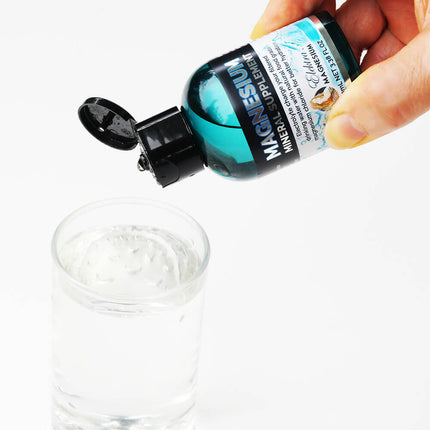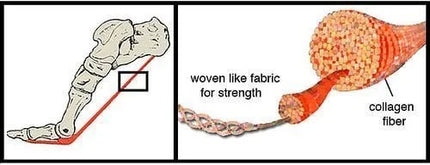Tax included and shipping calculated at checkout
Optimal nutrition for our children means they will have the best opportunity to realise their fullest genetic potential to be well balanced, healthy and happy into adulthood. We all want our children to be ‘upgrades’ from ourselves. We want to pass on our seeds to future generations, but what about the quality of those seeds when magnesium is low? Can ‘magnesium kids’ offer a better hope for optimal health over a lifetime?
“Epigenetics is the study of cellular and physiological phenotypic trait variations that result from external or environmental factors that switch genes on and off and affect how cells express genes.” (Wikipedia)
In other words, “Genes load the gun, but environment pulls the trigger.” Since Bruce Lipton’s book ‘Biology of Belief’, as well as other researchers, we have come to realise more and more that our genetic expression is not set in stone. We are not a prisoner of our genes, but rather we get downloaded a set of ‘programs’ per gene set that have certain settings switched on, off or on variable modes as per the dial on your oven. These settings are determined firstly by the state of health of the parents, and then continue to change according to the subsequent environmental conditions after birth.
Our cells therefore become a product of our environment. If you put cells under excessive chemical stress and don’t supply the right nutrition, water, sunshine, and oxygen, what you will get is a drop in the voltage of life force. The pH drops to acidic levels in cells and that sets the body up for inflammation, pain and decay. Degenerative diseases are a product of lifestyle and environmental exposures over time. It’s now something that happens not only to old people, but the diseases of arthritis, mental illness, metabolic syndrome (obesity) and cancer are now happening increasingly in younger people. All these emerging degenerative conditions have in common chronic magnesium deficiency.
As my husband Peter always says, “When you see an obese cat or dog, that animal didn’t have hands to open the fridge door.” The same applies to obese children. Children come into the world as sponges for learning. They learn about the world and how to survive in it from us – the parents. In the beginning we supply all the information about how to eat, how to self-care and how to behave. Therefore it is our responsibility to set them up from the beginning with the right structures for healthy lifestyle and self-care. The first place to start is with our own habits – which are always copied first!
In the beginning were the parents
Healthy children are made before conception. It’s one thing to abuse the cells of your own body as young adults and think you are invincible and can bounce back from any kind of self-abuse: and it’s an entirely different matter to pass the negative consequences of this cellular damage onto your future offspring and leave them to have to deal with turning back the genes to better settings. Being a responsible adult first means taking the best care of yourself, ensuring your genetic expression is at optimal wellness before you decide to have children and pass on your ‘seed’.
Pregnancy
When magnesium is in short supply there is a trend for more difficulties in pregnancy and a higher chance of birth complications. A woman will experience much higher magnesium demands to grow a baby in the womb, which can take 10% of her own minerals out of her bones if she is not replenishing her supplies adequately. Manifestations of low magnesium can be a feeling of ‘wiggly’ or loose teeth in the gums by the third trimester of pregnancy, involuntary muscle twitching and cramps, restless sleep, excessive back pain, swollen feet and oedema, as well as pre-eclampsia (high blood pressure). When magnesium is low, stress responses are also more acute and we can feel easily overwhelmed by the simplest of things.
When a child is born to a magnesium-deficient mother, both mother and child have a more difficult time managing stress. A baby can be more prone to symptoms of cholic, not settling or sleeping well, and keeping Mum awake too long at night, which leads to more stress and even lower magnesium levels for both: A downward spiral. This can result in symptoms of depression (chronic fatigue) in the mother and irritability and failure to thrive in the child. Adequate magnesium in the right nutritional protocol can solve these issues and turn the experience right around into what it should be – a loving, exhilarating and enriching experience of mothering a happy responsive child that thrives and loves to play.
Sugar is poison
Children, being little people, have smaller bodies which react more quickly to stimuli. They are more sensitive to chemicals, dehydration or eating junk food laden with sugar and processed carbohydrates. They will therefore react more quickly compared to an adult exposed to the same stresses. When magnesium is low they will react even more acutely, sometimes with bizarre behaviours. One jellybean could set them off flying around the room with uncontrolled hyperactivity, followed by an energy slump and utter exhaustion.
Birthday parties with sugary cupcakes, fairy bread and soft drinks end up being a disaster for parents with children who are magnesium deficient because magnesium deficiency shows up as ‘sugar sensitivity’. Processed sugar and carbohydrates steal the little bit of magnesium their tiny bodies do store, leaving their cells unprotected with inadequate magnesium levels and prone to inflammatory responses and hyperactivity. It is too often
the case that this ‘elevated state’ and inability to focus, sit still or concentrate is sometimes misdiagnosed as ADHD, when the symptoms are actually a sign of magnesium deficiency. As this deficiency is corrected by increasing magnesium availability, the symptoms subside and disappear.
Depleted with stress
Fundamentally, magnesium is the trunk of our nutritional tree, supporting the other nutrients and enzyme activities of cells. In other words, all cell functions rely on electrical energy which is dependent on magnesium. Even our DNA links require magnesium to repair. Studies have shown magnesium deficiency leads to DNA cleavage (breaks).
Magnesium is the most vital mineral electrolyte. It is the centre of the chlorophyll molecule in plants, chlorophyll being used by plants to convert sunlight energy into starches. This energy is then transferred to animals when they eat the plants, and then to humans when they eat those plants and meats. The mitochondria of our cells use magnesium to produce adenosinetriphosphate (ATP) – the energy currency of the cell. Magnesium is intimately involved in our energy metabolism, its balance and regulation. When magnesium is low the energy supplying enzymes is low and therefore many systems can malfunction or perform at sub-optimal levels, including digestion and detoxification, brain, immune and cardiovascular function, as well as the building of new cells for growth, healing and repair.
We lose magnesium under stress. The more stress, the more magnesium is used up to relax and re-balance our system from the excess adrenaline and other stress hormones that are temporarily released for hyper-active states of ‘fight or flight’. These hormones cause the flow of calcium into muscle cells to contract them, as calcium is a hardening agent. Calcium ions are ‘attractive’: They cause protein fibres to pull together. It causes energetic bursts, firing and muscle contractions. Once the danger or the need for hyper-activity has passed, the muscles need to relax again, which means magnesium is required to go back into the muscle fibres and release the grip of the calcium. It is a delicate and lightning-fast operation of switching that takes place in active muscles. Calcium contracts and magnesium relaxes.
Once the magnesium is used this way the blood levels go up, which is detected by the kidneys, and magnesium is then excreted to bring blood levels back to homeostasis. In this way magnesium is lost under stress and not recycled.
When people (children or adults) get sick with inflammation and pain it is because the cells have been excessively stressed without sufficient magnesium recovery, thereby depleting stores. When magnesium stores get low, detoxification slows down and pollution builds up, causing cell pH to drop to acidic levels. Low pH invites pathogenic bacteria and fungus to make their homes in our bodies, which causes our immune system to go into overdrive, resulting in inflammation, swelling and pain in various locations.
Healing and Repair
Have you ever had a cold and gone swimming in the ocean, only to find your cold clears up very quickly afterwards? This is because the salts (including large quantities of magnesium) in the ocean get absorbed via our skin (epidermis), the lining of the nasal passages and lungs. This electrolyte replenishment helps to rebalance pH levels in cells. When they regain their healthy alkaline levels the immune system once again has access to plenty of oxygen in the form of hydrogen peroxide for the destruction of pathogens and restoring the system to normal.
We can mimic this replenishment in the bath at home using a cup of magnesium chloride flakes and soaking for half an hour. Children love some extra bubbles and essential oil fragrances. Be careful not to add harsh detergents or chemicals to the mix. You can be creative to make bath-time with magnesium a lot of fun. When we are ill with inflammation and pain, or under high levels of stress, we need a lot more antioxidant support than normal, so in addition to magnesium baths, you can also use transdermal magnesium products throughout the day. Vitamin C is also a powerful antioxidant, as are herbal teas with honey, fresh squeezed lemon and fresh grated ginger. Natural coconut water is a favourite taste treat with many children and is a good electrolyte magnesium re-hydrating liquid food. For something cosy nothing beats ‘grandma’s timeless recipe’ of chicken and vegetable soup containing that rich bone broth of minerals.
Digestion doesn’t work very well when the body is ill or under stress, so the less work the stomach has to do during the recovery phase the better. Focus more on nutrient-dense vegetable juices, broths and soups. Beetroot is great for blood cleansing and your greens are high in magnesium. Apple is a fruit you can add to vegetable juices for taste without having the mixture cause wind or bloating. Coconuts and their juice, milk and meat are high in magnesium and also help to detox.
Avoid deep-fried foods as this process causes trans-fats to form which are highly oxidised and cause free radical damage in cells. Sorry, but chips are out. Slow-baked thinly sliced vegetables to form crisps with raw salt seasoning is much healthier. Coconut oil or raw butter are better for cooking stir-frys, stews and soups because they are not prone to oxidation like vegetable oils. Use your olive oil for salad dressing instead!
Essential oil therapy can help to sooth irritation and relieve nasal or chest congestion in colds and flu – particularly frankinsense, oregano and menthol. You can also use melaleuca. If you use essential oils in a diffuser make sure to add a few flakes of magnesium chloride to the solution so you get a whole package of goodies being breathed into the lungs for calming and relaxation.
A relaxing massage using Elektra Magnesium Cream made of rich plant oils and butters infused with magnesium can work wonders to calm down inflammation, relieve spasming muscles that are stressed from too much coughing, and to promote a sound sleep. Even without illness and just to promote a better night’s sleep, some magnesium chloride flakes
in the bath followed by a little magnesium massage works wonders. It’s good for Mum and Dad too!
Children’s immune systems can become challenged by pathogens or ‘bugs’ in the environment from time to time. This is how their systems learn to create their own antibodies and over time they become more and more resistant to infections – as long as their nutrient levels are high enough! The challenge strengthens the immune system as it learns to build the right defences. It’s like training your muscles at the gym. In the old days mothers knew to gather all the children in the street and have a ‘chicken-pox’ or ‘measles’ party if one came down with symptoms, so they could all catch the infections, go through the process of healing and have it over and done with, acquiring thereby natural immunity for the rest of their lives.
Mineral and vitamin-rich nutrition combined with essential oil therapies should be first and foremost in your natural health ‘tool box’ to support the body’s natural healing processes and recovery to become fitter and stronger than before. (If children don’t respond and you become worried that it may be something more serious please seek the advice of your doctor.)
Of course, good daily nutrition, avoiding processed ‘chemicalised’ foods and drinking adequate clean chemical-free water should be our ‘norm’ so that our immune systems have plenty of ammunition to deal with invaders. It’s not just something you do when you feel the pain or get sick, but should be a daily routine to avoid health decline. Fresh colourful vegetables and fruits pass on large amounts of voltage and life force with a package of enzymes, vitamins and minerals when we consume them in their fresh state. They also play a big role in detoxification so our cells can ‘take out the garbage’ as needed.
Growth spurts
Children often go through growth spurts where they can experience bone and joint pain. Bones are made of many minerals, including calcium, potassium, phosphate, zinc, boron, strontium, silica, iron and very importantly – magnesium. Magnesium combined with phosphate helps build strength as well as shock-absorbing ability. If these minerals are low, despite having plenty of calcium, the bones can become brittle and break more easily. In elderly people this is called osteoporosis. It is commonly thought that a lack of calcium causes this problem, however magnesium researchers have found that it’s actually low magnesium and phosphorous that are the main contributors. Calcium itself is chalk-like in structure and breaks easily. We need a composite of minerals for the healthiest bone structure.
In children, a lack of magnesium can cause inhibition of bone growth and slowness to thrive. These children tend to have smaller statures. To ‘beef’ up the minerals in their diet make more vegetable / meat soups (simmered slow and low or pressure cooked) with a base of
bone broth so that the bones and skin are included in the meat broth. The bone marrow is extremely rich in minerals and gelatine – which greatly assists digestion. These soups also support the microbiome of the gut which helps us to digest food, and looks after the immune system and gut lining. Our beneficial gut bacteria also need lots of magnesium power!
Natural food – Natural water
Flavouring meals with raw sea salt and sulphur-containing foods such as garlic, onions, ginger and sesame will enhance the nutritional quality and taste of those foods, as well as support their digestion. When mums-to-be enjoy eating this way during pregnancy (within their comfort zone) they are introducing a complex mix of flavours, vitamins and minerals so it becomes a recognisable imprint on the unborn. A breast-fed baby will be able to taste these flavours coming through the mother’s milk. This way it is easier to train their taste buds so they get used to the way healthy food should taste!
Remember that water is the most important nutrient that must be consumed regularly throughout the day. If you don’t drink enough water your energy levels drop. Sugar only makes us thirstier and causes more acidity. If you keep drinking soft drink to quench a thirst all you do is pollute cells more and deprive them of the ability to cleanse properly. Just because it’s a liquid, doesn’t mean it is water. All beverages are liquid foods and must be digested, which takes extra energy and effort. Some beverages can even deprive the body of more water than they donate. They don’t help cells flush their waste products like water does.
Water is our superior cellular cleanser and ideally should not contain chemicals of any sort – particularly not chlorine nor fluoride. Both these chemicals harm our beneficial gut bacteria and cause problems with digestion, including stomach aches and bloating. They can also cause skin irritations such as eczema, psoriasis and dermatitis or itchy rashes and dryness.
You can boil the chlorine out of water but you can’t boil the fluoride out. The fluoride just becomes more concentrated and therefore more toxic in the boiled water.
Fluoride also binds up magnesium. That is how it inhibits enzyme activity. All the benefits that magnesium provides in mitochondrial energy production, are dampened down and reversed by fluoride. There are only about 5% of countries in the world that still fluoridate their tap water. To get the fluoride out you need a reverse osmosis filter, or special ion- exchange filter. Always ask the filter manufacturer if they have laboratory tests to show their filters really do get the fluoride out and in what quantity, as it’s a small molecule and very stubborn to remove. You can also drink rain water or bottled spring water.
When water is filtered it becomes ‘empty’ water without minerals and with a lower pH – usually 6pH. It is advisable to add the minerals back in with food grade magnesium chloride mineral flakes (approx. 3-5 flakes per litre) and optional extra bicarbonate of soda (8th
teaspoon per litre) to make a balanced alkaline mineral drinking water. This makes the water more hydrating because of the electrical charge. Cells love it. They take up more mineral water, which helps them also to flush out more wastes. If your children don’t like the taste of water that is very sad! Help them to get used to drinking plenty of water for best health. If you need to flavour the water with something try a couple pieces of fruit as infusions in the bottle. Over time hopefully they will just go for straight mineral water.
Teenage blues
Teenagers often suffer from magnesium deficiency because of their rapid growth spurts, sporting and other physical activities, pressure at school and hormonal changes. It can show up as an easily irritated and frustrated temperament, pimply skin and depression. These symptoms are a sure sign of low magnesium status. To remedy, make sure to avoid processed and chemicalised junk foods, sugar and canola or margarine products, drink adequate mineral water and eat a fresh vegetable and hormone-free meats and eggs diet.
The GAPS diet by Dr Natasha Campbell-McBride is excellent for very sensitive digestive systems (actually for everyone!). Many researchers recommend avoiding wheat, as most wheat is now genetically modified and hard to digest properly, leading to excessive acid by- products and inflammatory responses. It has been found to contain traces of glyphosate – a chemical implicated in the proliferation of autism and leaky gut syndrome. Support your gut microbiome with daily doses of naturally fermented foods like sauerkraut, kimchee, kefir and/or plain full fat yogurt (no flavourings or colourings).
Relax!
Finally, make sure the family takes some time out to relax doing fun stuff! Recreational and creative activities such as music, art, tai chi, yoga, dance, beach swimming, fishing, climbing or hiking offer unique opportunities to relax and recharge your cells after excessive magnesium loss under stress.
Quality sleep is also extremely important, so you may have to turn off that blue screen at 9pm. The brain works best adhering to natural biorhythms and sleep-wake cycles, which means going to sleep well before midnight. The quality of sleep after midnight is much less. During deep sleep our pineal gland makes melatonin, which is the most powerful anti- oxidant in the body. The pineal gland also needs a lot of magnesium and deep sleep to function well and produce enough melatonin. That’s one of the reasons why a magnesium bath before bed helps to promote a deeper sleep. There is nothing like a good sleep to recharge and replenish – most especially for a teenager!
Family dynamics is such that children readily pick up the stress of their parents and collectively a whole family can become magnesium deficient. Apart from losing magnesium under stress, we also get short-changed of magnesium with our foods today as the soils used to grow foods have low magnesium. Food processing also causes loss of magnesium,
as it is highly water soluble and easily lost in water during cooking. That’s why soups are best to scoop up the dissolved magnesium and other minerals that have leached out of the meats and vegetables into the broth.
Most of us in modern societies develop magnesium deficiency to some extent and it can become impossible to get enough magnesium back into the cells just from digestion of foods alone (and even less with tablets) if we have been subjected to chronic stress.
However transdermal absorption allows our body to catch up in a natural and non-invasive way.
Share your magnesium footsoaks and give each other magnesium massages. There really is no limit as to how much you can use transdermally. The epidermis acts as a reservoir of nutrients whilst the capillaries of the dermis underneath passively take up what the body needs and can cope with at any one time. The body in this way is self-regulating. When it has enough it switches off absorption until it again needs more.
Everyone in the family can start to feel calmer and more relaxed as a result. Without the stress overload, and with ample magnesium to assist recovery, our bodies can regenerate, repair, heal and grow strong the way they are supposed to – naturally. By cultivating our ‘magnesium kids’ we have a better chance of heralding the beginning of a new more resilient human being that can overcome and triumph against the stresses and chemicals of this era, which seek to rob us of magnesium and our life force…
by Sandy Sanderson © 2016-2019






